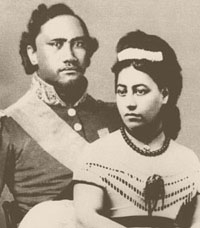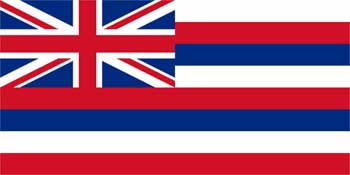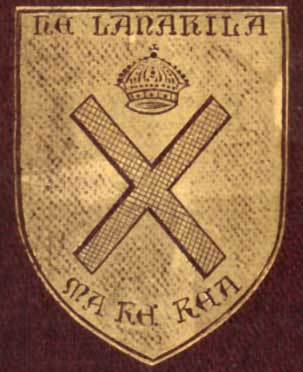

|
|
Aloha
kakou.
In 1793, Captain George Vancouver visited what were then called the
Sandwich Islands on a voyage of cartography, diplomacy, trade and exploration.
Before he left Hawai'i, history tells us that Vancouver gave his word
to King Kamehameha the Great that on returning to England he would ask
King George III to send missionaries to Hawai'i in gratitude for his
warm welcome to the archipelago. (Some sources report that Kamehameha
had specifically asked Vancouver to send Anglican missionaries.)* Vancouver
dutifully proposed the idea to responsible authorities on his return,
and the matter was forgotten in short order, dismissed as unpragmatic as
well as constitutionally impossible.
 For
more than half a century thereafter, ecclesiastical, legal and political
impediments relegated the Hawaiian islands to be 'isles that wait' with
respect to this promise. In the interim, French Catholic and American
Congregationalist and Presbyterian missionaries arrived with evangelical
strategies distinctly different from ours. In 1822, Liholiho Kamehameha
II wrote directly to King George IV: 'we wish the religion
of your Majesty's dominions to be practised here.' Inaction was his reply.
Members of the reigning Hawaiian
royal family visited England, met Queen Victoria, worshipped at Westminster
Abbey, and returned with striking impressions of dignified worship in
an awe-inspiring setting. They returned, and renewed an invitation that
echoes down the centuries from Macedonia and the Book of Acts: 'Come
over and help us.' Finally, a petition from Kamehameha IV made its way
directly from Honolulu to the then Bishop of Oxford, who set in motion
the work of a committee to send a bishop and priests in response to this
invitation--a request unparalleled in modern times. For
more than half a century thereafter, ecclesiastical, legal and political
impediments relegated the Hawaiian islands to be 'isles that wait' with
respect to this promise. In the interim, French Catholic and American
Congregationalist and Presbyterian missionaries arrived with evangelical
strategies distinctly different from ours. In 1822, Liholiho Kamehameha
II wrote directly to King George IV: 'we wish the religion
of your Majesty's dominions to be practised here.' Inaction was his reply.
Members of the reigning Hawaiian
royal family visited England, met Queen Victoria, worshipped at Westminster
Abbey, and returned with striking impressions of dignified worship in
an awe-inspiring setting. They returned, and renewed an invitation that
echoes down the centuries from Macedonia and the Book of Acts: 'Come
over and help us.' Finally, a petition from Kamehameha IV made its way
directly from Honolulu to the then Bishop of Oxford, who set in motion
the work of a committee to send a bishop and priests in response to this
invitation--a request unparalleled in modern times.
 Still,
the church resisted. Even after concrete plans for sending a mission
to Hawai'i had been made, the press was full of protests against the
possibility of consecrating a bishop for territory outside the British
Empire. By the time Thomas
Nettleship Staley arrived in 1862
as the first Bishop of Honolulu, the Anglican mission was but one among
many contenders rather than first in the field. No sooner than he arrived
with a handful of assistants, however, Anglican sacramental and cultural
life began to flourish almost ex nihilo. The 1860s became to Hawaiian
Anglicanism what the Quattrocento is to Italian art. King Kamehameha
IV himself
translated the Book of Common Prayer and many hymns into his
first language. A cathedral, royal
mausoleum, schools and churches rose
in striking beauty from the islands' lava. Educational work proceeded
full-steam ahead with the encouragement of Hawaiian, English and
American teachers, as well as John Keble and E.B. Pusey. Perhaps
most notably, King Kamehameha IV and Queen Emma forged through daunting
lives with heroic patience, virtue and charity; today they are commemorated
on the calendar of the American Book of Common Prayer. Still,
the church resisted. Even after concrete plans for sending a mission
to Hawai'i had been made, the press was full of protests against the
possibility of consecrating a bishop for territory outside the British
Empire. By the time Thomas
Nettleship Staley arrived in 1862
as the first Bishop of Honolulu, the Anglican mission was but one among
many contenders rather than first in the field. No sooner than he arrived
with a handful of assistants, however, Anglican sacramental and cultural
life began to flourish almost ex nihilo. The 1860s became to Hawaiian
Anglicanism what the Quattrocento is to Italian art. King Kamehameha
IV himself
translated the Book of Common Prayer and many hymns into his
first language. A cathedral, royal
mausoleum, schools and churches rose
in striking beauty from the islands' lava. Educational work proceeded
full-steam ahead with the encouragement of Hawaiian, English and
American teachers, as well as John Keble and E.B. Pusey. Perhaps
most notably, King Kamehameha IV and Queen Emma forged through daunting
lives with heroic patience, virtue and charity; today they are commemorated
on the calendar of the American Book of Common Prayer.
 The
Anglican mission was not without its significant problems over time--including
inevitable personality conflicts, inter-mission pamphlet warfare, property
disputes, and, later, crippling internal
accusations of apostacy--but
once it was allowed by Church and Crown to puts its oars in the water,
it flourished to a degree that no one could have expected. We have no
way of knowing whether the gentle, steady upwelling of Anglican life
in the 1860s would have taken place with a different cast of characters
70 years earlier when the mission might have begun. (Something tells
us that Wesleyan Anglican seriousness could have met with a good hearing
on Maui shortly after Vancouver's initial visit, though.) And it is difficult
to know just why the Anglo-American mission was finally allowed to proceed
when it did; at least one scholar believes it had as much to do with
a pressing need for Hawaiian sugar during the naval blockade of Confederate
states during the American civil war as it did with genuine promptings
of piety and the work of the Holy Spirit. (We do not doubt for our part
that the Holy Spirit could have been working through fluctuations in
the sugar market.) The
Anglican mission was not without its significant problems over time--including
inevitable personality conflicts, inter-mission pamphlet warfare, property
disputes, and, later, crippling internal
accusations of apostacy--but
once it was allowed by Church and Crown to puts its oars in the water,
it flourished to a degree that no one could have expected. We have no
way of knowing whether the gentle, steady upwelling of Anglican life
in the 1860s would have taken place with a different cast of characters
70 years earlier when the mission might have begun. (Something tells
us that Wesleyan Anglican seriousness could have met with a good hearing
on Maui shortly after Vancouver's initial visit, though.) And it is difficult
to know just why the Anglo-American mission was finally allowed to proceed
when it did; at least one scholar believes it had as much to do with
a pressing need for Hawaiian sugar during the naval blockade of Confederate
states during the American civil war as it did with genuine promptings
of piety and the work of the Holy Spirit. (We do not doubt for our part
that the Holy Spirit could have been working through fluctuations in
the sugar market.)
But these questions
are as academic as they are immaterial; the lessons of Anglican
beginnings in Hawai'i are clear, fascinating, warning and inspiring.
A church that allows itself to be fettered by artificial canonical
impediments about jurisdiction can hamper the spread of the Gospel
indefinitely--for as long as decades--while people with the hope of
glory and eager for the means of grace stand and knock. Hesitation
at self-evidently crucial moments in social or political change can
undermine the credibility of the Christian faith and the effectiveness
of those sent to preach it. Finally, churchly infighting can hobble
the Church's potentially critical opportunity to serve as a terrestrial
colony of heaven: a place of health and stability during times of geopolitical
upheaval.
This Ascensiontide, as we watch our Lord go up with a merry noise to
prepare a place for us on high, our thoughts turn to the readiness of
the Church on earth to prepare a place for those who stand to benefit
from her care here. Hawai'i has lessons for those who have ears to hear
and eyes to see.
Happy Ascensiontide. See you next week.

All of us here at Anglicans Online
|

